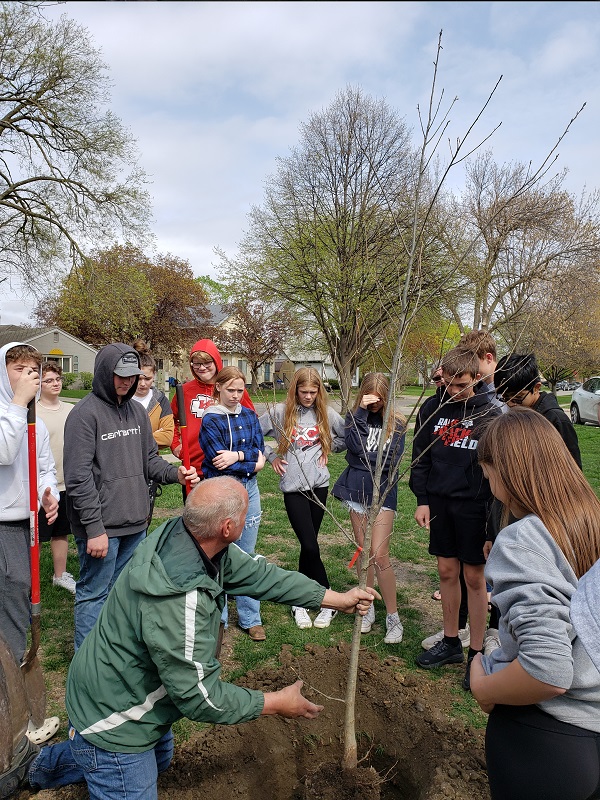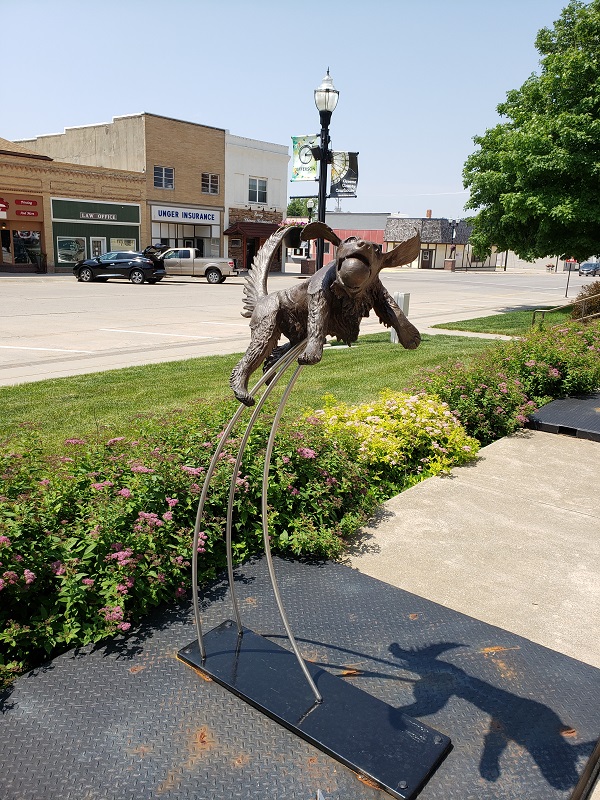The asphalt is barely cool on W. Lincoln Way and the Jefferson city council is starting the process of improving E. Lincoln Way from Locust St to the east city limits.
The council at its July 25 meeting accepted a proposal from Bolton & Menk for engineering services for the project to include milling the existing pavement, curb and gutter repairs, pedestrian ramp improvements, widening the pavement where curbs were installed on the north side of the street, and an overlay on all pavement areas.
Cost of the engineering contract is not to exceed $141,400.
Cost of the project is estimated at $740,000, which would likely be paid through general obligation bonds.
City administrator Scott Peterson provided the council information from Piper Sandler regarding the city’s bonded indebtedness and how the current debt schedule aligns with property tax rates. If the city incurred no further debt, the property tax levy would drop significantly, from $2.13 (per $1,000 in taxable valuation) in the current fiscal year to less than $1.29 in the next year and years thereafter.
“But if you’re looking at keeping consistent property tax rates, now would be a terrific time to take a look at doing this,” Peterson said, referring to the E. Lincoln Way project. He asked council members to “keep that thought open” as they looked at other projects.
He said the city could issue $1.5 million in new debt and maintain the current tax levy. He said later in the meeting, during discussion of the Kading Properties housing project, that consistency in the tax rate is desirable.
Mayor Matt Gordon questioned the need to widen the street rather than doing only an overlay. City engineer Jim Leiding explained that since the project that extended sidewalk out to the cemetery, there is a portion of the north side of the street where the pavement does not reach the curb, and that widening would be done only there. That would provide a little bit wider lane for travel in both directions.
The next step will be refining the cost and setting up financing. Construction could begin next summer.
The council also approved the first reading of an amendment to the ordinance increasing yard waste fees for city residents. Council member Dave Sloan explained that increased usage of the yard waste disposal site adjacent to Daubendiek Park, due in large part to ash trees killed by emerald ash borers, has made the expense of operating the site greater than revenues.
The city periodically hires a company to chip the waste wood and haul it away at a cost of $25,000 per time. In the past that was needed once a year. It now needs to be done two or three times a year.
The yard waste fee on monthly city services (water, garbage, etc.) bills will increase from $1 to $3. Additionally, the cost of stickers for yard waste bags will increase from $1 to $2.
Jefferson is one of the few towns that provides a yard waste site for residents.

The council approved participating in Trees Forever’s carbon credit program. The Jefferson tree committee has partnered with Trees Forever for many years in planting street and park trees.
In the carbon credit program, Trees Forever will pool trees enrolled in the program to claim federal carbon credits, and then return those credits to the towns where the trees are planted. The program is long-term; trees must be maintained for 26 years to receive the credits.
A natural mortality of up to 20 percent of the planted trees is acceptable. If more trees in the program die due to intentional actions or gross negligence, the city will need to pay back credits already received or forego future credits. Trees that die due to storm, fire, unforeseen pest infestation or other “acts of God” are not included in the 20 percent.
“It’s not huge amounts of money involved here, but it’s just a nice way to participate in something right now, not knowing what it will bring in the future,” Peterson said. “If we had 100 trees, $2,284. It’s not huge dollars, but it’s dollars you can turn around to purchase more trees.”
Trees planted in 2021 and 2022 can be included as well as those planted this year and going forward.
The council also approved impound fees for the Greene County Animal Shelter. Dog owners will be charged a $20 impound fee for a dog taken to the shelter, plus $20 for each day the animal remains there after the first 24 hours.
City council member Darren Jackson, an animal shelter board member, said the impound fee is to cover the cost of shelter, food, and staffing, and also to reduce the number of “frequent flyers.”
Other county towns will be asked to sign a 28E agreement and pay a $200 annual fee to allow dogs from their town to be taken there. The sheriff’s department, which provides law enforcement in the towns, will not transport animals. Animals from other towns would be brought in by residents.

User fees for the dog park were not included in the ordinance as the animal shelter board has not agreed on what those fees should be. There is discussion concerning enforcement and whether the dog park should be available only to licensed dogs for which vaccination is verified.
In other animal shelter news, the council accepted the donation by Beth Vander Wilt of the “Play Ball” sculpture now displayed on the Bell Tower Plaza. The sculpture will be a memorial to Keith Vander Wilt, who passed away a year ago.
The council set a public hearing for Aug. 8 on an easement for Hardin Hilltop Wind LLC to put a new substation at the wind turbine facility. The new substation is needed because ITC has upgraded its high voltage lines, with the actual switch over in 2024, Hardin Hilltop Wind partner Bill Sutton explained. That requires small wind generators to upgrade their facilities to accommodate that.
The substation is on city-owned property on Orchard Ave, across the road from Central Iowa Redi-Mix, formerly Hamilton Redi-Mix. Hardin Hilltop Wind currently has an easement for 70’ by 120’ with access; the larger substation will require 100’ X 120’.
Sutton said the substation will be used for at least 10 years, but probably much longer. “An interconnection site into the (energy) grid is a valuable thing…. Whoever owns it into the far distant future will want to have a good facility there. That’s what we’re trying to build,” he said.
The council tabled a discussion of going through strategic planning and goal setting with a paid consultant. Peterson had solicited proposals from four consulting firms to assist the city in the process of developing goals and then action steps to achieve them. He asked the council to accept the idea and select a firm. One of the firms had proposed a calendar with a start date of July 31.
The goal setting and planning could be done annually or biannually, he said. “No matter what, you want to know exactly where it is you want to go,” Peterson said, and added that the process would have “great value” to him. “It lets you really concentrate on the things that are important.”
The council was reluctant to make a decision without council member Harry Ahrenholtz present.
The council approved the final payment and acceptance of the 2022 Russell St watermain project.
During the Reports portion of the meeting, mayor Gordon suggested the city begin working on a plan to improve hiring in the Jefferson police department.
With the recent increase in wages for Greene County sheriff’s deputies, the lowest paid deputy is paid $20,000 more annually than a JPD officer. The department is currently three officers short. Chief Mark Clouse said he has hired an officer conditional on him passing the needed testing, but other than that, there is no other movement on the staffing front.
“I just don’t know how long we go on being that many people short without taking a look at what we do,” Gordon said.
Jackson suggested the Greene County Career Academy start a criminal justice strand. Gordon said perhaps night classes could be offered.
